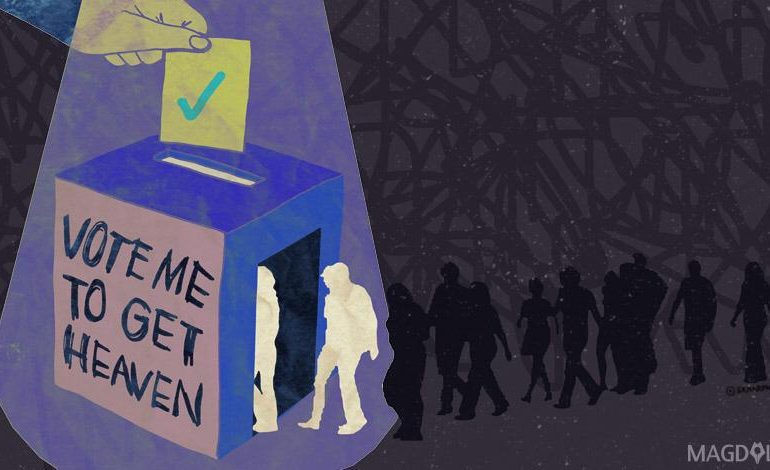Rising Religious Conservatism, Intolerance Weaponized
The Indonesian Institute of Sciences (LIPI) study found that religion has become a central part of political campaigns nationwide, worsened by increasing conservatism and intolerance.

Almost all Indonesians agree that Pancasila is the best ideology for the country, but the belief doesn’t stop them from being intolerant of people of other faiths, according to the latest research
Sumbu Pendek, a research on intolerance and radicalism conducted by the Indonesian Institute of Sciences (LIPI), found that 40 percent of the population reject the construction of buildings of other religions in their surroundings, although nearly all of them agreed with the country’s founding philosophy, which stresses the belief in humanity, unity, social justice, and a respect in a universal God.
Events in the past few years have shown that religious intolerance has grown significantly and is often weaponized for political benefits.
“Years ago, conflicts in Indonesia are communal, between religious or ethnic groups. Now the tension is more about rising religious conservatism, intolerance, expression of hatred in social media and the persecution of minority groups,” said Cahyo Pamungkas, who led the LIPI research, during a discussion last week (Oct. 30).
Unsurprisingly, religion has become a central part of political campaigns nationwide. Yogi Setya Permana, a qualitative researcher at LIPI, recalled the case in South Sumatra provincial election, when the campaign rhetoric went along the line of “do not choose leaders of different religions because the sin is heavier than drinking alcohol and eating pork.”
He expressed concern that the presidential election in 2019 would amplify intolerant religious sentiment and religious conservatism.
“Using religious conservatism is the easiest way to gain economic and political benefits from people. Just tell people what they think their religion want them to do and they will be in line with you. Even if they know in their heart that something is off, they would think it is wrong to question and disobey their religion,” added Yogi.
Many factors contribute to rising intolerance and radicalism in Indonesia, but social media have been an important factor to the phenomenon, with the spread of hate speech and hoax creating the perception that the Muslim majorities in Indonesia are under threat.
The study shows that while nearly all respondents believe their religion is crucial to their lives, only 40 percent would double check on news or articles on religion that provoke intolerant sentiment.
“Social media is no longer a place to express emotions and opinions but to silence and exclude others, in this case the minorities,” said Cahyo. “People would read something on their Whatsapp and they would get scared. Nobody is saying anything to contradict the information, even if they know that it is possibly false. That is how you silence minorities.”
Unfiltered messages on social media create irrational fear to members of both the majority and minority groups, further dividing them and raising suspicion and fear of each other.
“Some people would write and post fake news on social media to spark religious fear and tension. They rely on people to spread the information, because they know readers will not check their validity,” he said. “This happens especially for political purposes such as in elections or to help movements that benefit certain groups. They are banking on the fact that the majority of people lack media literacy.”
In the long run, the aim is to take away the rights of the minority groups, such as their rights to build places of worship, express their opinions and get the same facilities as others.
The study also shows that sixty percent of the respondents support violent measures to those they believe to be followers of “heretical” faiths.
“More than 20 percent of our respondents admit to having heard about Muslims who were converted to Christianity, almost 60 percent of them believe it and are afraid of so-called Christianization. This explains why they are afraid and very defensive of their religion,” Sari Seftiani, a quantitative researcher at LIPI.
But the research also finds that women can play a part in fighting radicalism and intolerance.
As part of the research, LIPI analyzed articles published by Tribun News, the most accessed Indonesian online news site, published on December 3, 2014 to May 20, 2018 and found that the news mostly centered on young generation as the most vulnerable to radicalism, and family and women as the counter to radicalism.
“The 123 articles on Tribun News that we studied show that women are both prone to radicalism and could be an antidote against it,” said Purnama Alamsyah, a network analysist and discourse researcher.
“Women in families could impact their home: children, husband, siblings, and parents greatly to prevent them from becoming radical and intolerant. Women are proven to think more for the good of many than just one group. They are more likely to be able to drive their family to think rationally than fanatically,” he said.
“In the end, the ultimate goal is to avoid and eliminate radical groups and intolerance, but it all starts with a strong foundation from home,” he added.
Find out how poor sanitary and hygiene condition at schools affect female students.












